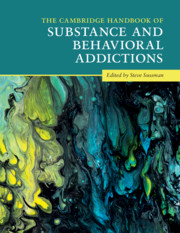Book contents
- The Cambridge Handbook of Substance and Behavioral Addictions
- The Cambridge Handbook of Substance and Behavioral Addictions
- Copyright page
- Contents
- Figures
- Tables
- Contributors
- Foreword
- Preface
- Acknowledgements
- Part I Concepts of Addiction
- Part II Clinical and Research Methods in the Addictions
- Part III Levels of Analysis and Etiology
- Part IV Prevention and Treatment
- 15 Adolescent Drug Misuse Prevention: Challenges in School-Based Programming
- 16 Treatment of Alcohol, Tobacco, and Other Drug (ATOD) Misuse
- 17 Prevention and Treatment of “Food Addiction”
- 18 The Prevention and Treatment of Gambling Disorders: Some Art, Some Science
- 19 Prevention and Treatment of Sex Addiction
- 20 Passionate Love Addiction: An Evolutionary Survival Mechanism That Can Go Terribly Wrong
- 21 Prevention and Treatment of Compulsive Buying Disorder
- 22 Prevention and Treatment of Work Addiction
- 23 Gaming Disorder and Its Treatment
- Part V Ongoing and Future Research Directions
- Index
- References
20 - Passionate Love Addiction: An Evolutionary Survival Mechanism That Can Go Terribly Wrong
from Part IV - Prevention and Treatment
Published online by Cambridge University Press: 13 July 2020
- The Cambridge Handbook of Substance and Behavioral Addictions
- The Cambridge Handbook of Substance and Behavioral Addictions
- Copyright page
- Contents
- Figures
- Tables
- Contributors
- Foreword
- Preface
- Acknowledgements
- Part I Concepts of Addiction
- Part II Clinical and Research Methods in the Addictions
- Part III Levels of Analysis and Etiology
- Part IV Prevention and Treatment
- 15 Adolescent Drug Misuse Prevention: Challenges in School-Based Programming
- 16 Treatment of Alcohol, Tobacco, and Other Drug (ATOD) Misuse
- 17 Prevention and Treatment of “Food Addiction”
- 18 The Prevention and Treatment of Gambling Disorders: Some Art, Some Science
- 19 Prevention and Treatment of Sex Addiction
- 20 Passionate Love Addiction: An Evolutionary Survival Mechanism That Can Go Terribly Wrong
- 21 Prevention and Treatment of Compulsive Buying Disorder
- 22 Prevention and Treatment of Work Addiction
- 23 Gaming Disorder and Its Treatment
- Part V Ongoing and Future Research Directions
- Index
- References
Summary
Romantic love is a universal feeling that most individuals hope to experience in their lifetime. At its best, it is fulfilling, joyous, committed, and stable. However, there is a chance that love can become dysregulated, associated with a preoccupation with love objects, stalking, and/or depression. Feelings of love mimic individual’s neurobiological responses to drugs of abuse and can become an obsession that resembles behaviors of a substance-dependent addict. In this chapter, we discuss the evolution of romantic love and love addiction etiology. We speculate on four personality dimensions that may distinguish certain love-related behaviors and addiction. Finally, we draw from substance and behavioral addiction literature to suggest various prevention and treatment strategies for those who are susceptible to or currently afflicted by love addiction.
Keywords
- Type
- Chapter
- Information
- The Cambridge Handbook of Substance and Behavioral Addictions , pp. 262 - 270Publisher: Cambridge University PressPrint publication year: 2020
References
- 1
- Cited by

